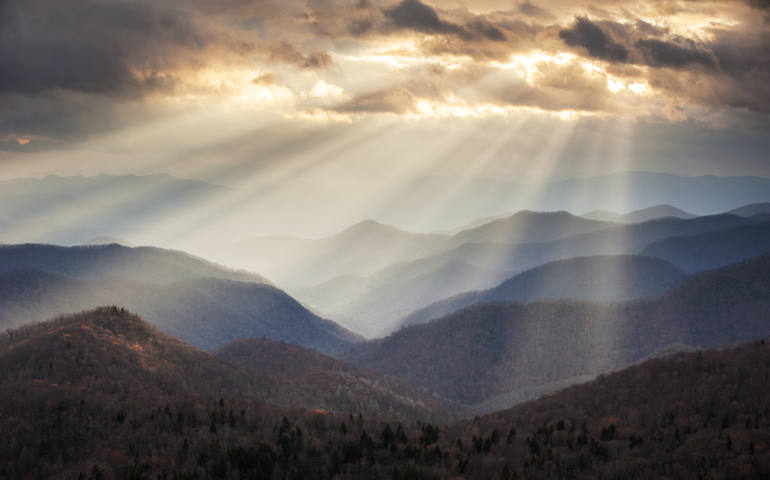
Appalachian Mountains in western North Carolina (Dreamstime)
Pastoral letters tend to function as top-down, formal documents from Catholic bishops filled with instructions and moral directives.
But for its next statement, the Catholic Committee of Appalachia, a 44-year old organization devoted to social and environmental justice, is flipping that model upside down.
Next year, the committee plans to publish a People’s Pastoral -- a grass-roots ecumenical “letter from the trenches” minus bishops’ official signatures, explained Glenmary Fr. Les Schmidt, one of the pastoral’s conveners. Schmidt held a similar role for past statements emerging from the region.
The People’s Pastoral will follow the committee’s two previous documents, This Land Is Home to Me (1975) and At Home in the Web of Life (1995). Written in free verse style by Joe Holland (now a theology professor at St. Thomas University in Miami), both documents were reissued in 2007 and included signatures from 25 bishops.
Still widely read, they are used in several college teaching settings in Appalachia, said Notre Dame Sr. Beth Davies, one of the original conveners. She recalled Brazilian Archbishop Dom Helder Camara describing This Land as the only Latin American document from North American bishops.
As for the People’s Pastoral, the committee has tapped Michael Iafrate, a lyricist/songwriter and one of its board members, as its primary author. Iafrate described the new document as a “pastoral update from Appalachia, listening once again to stories and taking into the account the rapid changes taking place over the last twenty years.”
The Wheeling, W. Va., resident is a doctorate student in liberation theology at the University of Michael’s College in Toronto. As an undergraduate at his hometown Wheeling Jesuit University, Iafrate became fascinated by the ability of the two Appalachian pastorals to present Catholic teaching “from below, rooted in people’s movements and communities rather than abstract principles.”
Planned for release in 2015, the People’s Pastoral will reflect the cries of the poor and the earth, said Schmidt, a Glenmary Home Missioner and native Virginian who has dedicated himself to a “listening ministry” among Appalachia’s poor since the early 1960s.
“The Lord hears their cry, but can we?” he asked.
Currently working on criminal justice reform around the issue of for-profit prisons, Schmidt hopes that the latest letter “will spark dialogue between those on the margins and the suffering earth, with church folks and all folks of good will.”
If bishops want to chime in with their reflections, that will be fine, too, he said. “Every voice has been invited and welcomed as long as they stand in solidarity with the poor and the earth.”
The final product, the Glenmary priest said, will be a “by-the-people, for-the-people document” with an invitation for the church to respond.
Other members of the People’s Pastoral committee include Davies and Jeannie Kirkhope, the committee’s administrative director. They have recruited volunteers from a broad Appalachian base -- parishes, congregations, intentional communities, social and environmental organizations -- to assist in the preliminary information gathering process.
Volunteers are conducting face-to-face listening sessions in West Virginia, Virginia, Tennessee, Kentucky, North Carolina and other parts of Appalachia. They seek to draw out the softest of voices -- people suffering from the environmental ravages of coal mining, hydraulic fracturing, mountaintop removal, chemical spills and compromised water quality, in addition to immigrants, Native Americans, the gay and transgender community, and families caught in the tragedy of abuse and drug addiction.
The committee’s website houses comments from listening sessions and offers an outlet for participation from outside Appalachia, and the pastoral will also welcome personal stories using art, music and poetry. Schmidt has hoped for a thousand total responses.
“We want to reach as many people as possible, particularly younger people,” Davies said.
So far, the committee has held 25 meetings in both large and small groups. Since January’s water crisis around Charleston, W. Va., community-wide outrage have upped the volume of voices, Kirkhope said. “Hearings have been going viral.”
Once all responses are gathered, Iafrate will begin writing.
Appalachia, he said, is one of the world’s “Galilees, so to speak. What good can come from West Virginia? These images have shaped and justified the economic and political choices that elites make,” he wrote in an email.
“People come to feel that we should be thankful to have just any job at all no matter how dangerous or soul crushing it may be.” The ideology of coal, he said, is everywhere in the state.
“Many people believe coal is all that they have, that it rules,” Iafrate said.
Because of its pervasive “idolatrous theology,” he continued, coal has taken over “not only our mountains, and communities, but our understanding of our history, imaginations and visions of future possibility.”
Once the document is published, a Virginia-based playwright will turn it into a theatrical production, using the poetry, music, art and storytelling talents of Appalachian residents.
The footlights of the theater, Kirkhope said, will aid the pastoral by utilizing the arts’ ability to serve as a catalyst for change, but also help spread word of the Appalachian committee, which in recent years has seen membership cut in half to 200 and declining support from bishops.
Kirkhope attributes fewer members to fewer parish social justice committees, and the lack of bishop support to a gap in priorities -- the committee focused on climate change and degradation of the land, and bishops with more institutional matters.
She told NCR she is hopeful that the pastoral “will resonate all over the world,” seeing Appalachia’s poverty as just one example of locales where the people and environment suffering from exploitation of natural resources.
“Appalachia’s agony is their agony, too,” she said.




